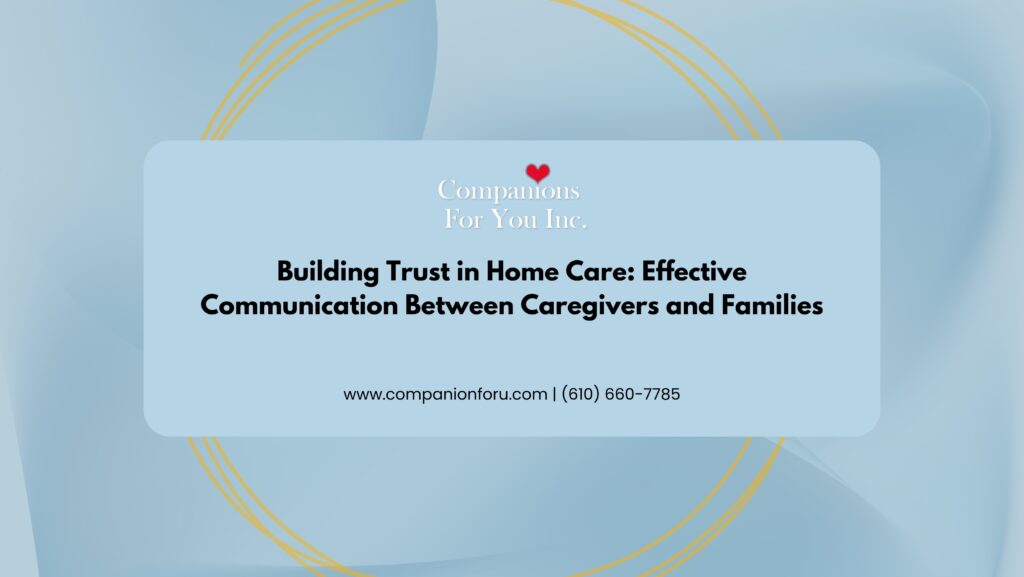Trust is the cornerstone of any successful home care relationship. Effective communication between caregivers and families is essential to build this trust, ensuring that seniors receive the highest quality of care. In this blog, we will explore strategies for enhancing communication and building trust in home care settings.
The Importance of Trust in Home Care
Trust in home care is crucial for several reasons:
- Ensures Quality Care: When families trust caregivers, they are more likely to collaborate effectively, leading to better care outcomes for seniors.
- Reduces Anxiety: Trust reduces anxiety for both the family and the senior, knowing that their loved one is in good hands.
- Promotes Transparency: A trusting relationship encourages open communication, allowing issues to be addressed promptly and effectively.
Effective Communication Strategies
To build and maintain trust, caregivers and families must engage in open, honest, and consistent communication. Here are some strategies:
- Regular Updates: Caregivers should provide regular updates to families about the senior’s health and well-being. This can include daily check-ins, weekly summaries, or monthly reports, depending on the family’s preferences.
- Open Dialogue: Encourage an open dialogue where family members feel comfortable sharing their concerns and asking questions. This can be facilitated through regular meetings or phone calls.
- Active Listening: Caregivers should practice active listening, ensuring that they fully understand the family’s concerns and needs. This involves giving full attention, acknowledging what is being said, and responding thoughtfully.
- Clear Communication: Use clear and simple language when discussing care plans, health updates, and any changes in the senior’s condition. Avoid medical jargon that might confuse family members.
- Written Communication: Provide written communication, such as care plans and progress reports, to ensure that families have a clear record of the senior’s care. This can also include emails or texts for quick updates.
Building a Strong Caregiver-Family Relationship
Building a strong relationship between caregivers and families goes beyond effective communication. Here are additional steps to foster trust:
- Consistency in Care: Ensure that the same caregivers are consistently assigned to the senior, allowing them to build a rapport and understand the senior’s unique needs and preferences.
- Empathy and Compassion: Caregivers should demonstrate empathy and compassion in their interactions with both the senior and their family. This helps in building a personal connection and trust.
- Transparency: Be transparent about the care process, including any challenges or changes that may arise. Families appreciate honesty and are more likely to trust caregivers who are upfront about issues.
- Respect and Privacy: Respect the senior’s privacy and dignity at all times. This includes being mindful of personal boundaries and ensuring that the senior’s preferences are honored.
Companions For You Inc.: Commitment to Building Trust
At Companions For You Inc., we understand the importance of building trust through effective communication and strong relationships. Our caregivers are trained to engage in open and honest communication with families, ensuring that they are always informed and involved in the care process. Visit our In-Home Care page to learn more about our commitment to trust and quality care.
Overcoming Communication Barriers
Communication barriers can hinder the development of trust. Here are some common barriers and how to overcome them:
- Language Differences: If there is a language barrier, consider using translation services or finding a caregiver who speaks the family’s language.
- Cultural Differences: Be aware of cultural differences that might impact communication styles and preferences. Respect and adapt to these differences to build a stronger relationship.
- Technology Challenges: Some family members may not be comfortable with technology. Offer alternative methods of communication, such as phone calls or in-person meetings, to ensure they stay informed.
Conclusion
Building trust in home care is essential for ensuring that seniors receive the best possible care. Through effective communication, empathy, and transparency, caregivers can foster strong relationships with families. At Companions For You Inc., we are dedicated to maintaining open lines of communication and building trust with every family we serve.For more information on how we build trust and enhance communication in our home care services, visit our Google Business Profile.

